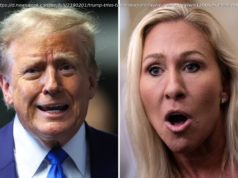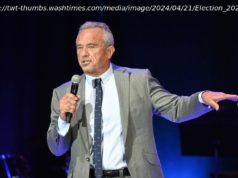President Trump distorted health insurance, his own legislative accomplishments, the biography of his deputy attorney general and French history.
WASHINGTON — In a wide-ranging interview with The New York Times on Wednesday, President Trump made a number of misleading and false claims about health insurance, his legislative accomplishments, the biography of his deputy attorney general and French history.
Here’s an assessment.
The Senate health care bill repeals taxes totaling $700 billion over the next decade. People of all income levels would see some of the money, but two-thirds of it would line the pockets of the richest one-fifth of Americans.
Middle-class households would see an average tax cut of $280, according to the nonpartisan Tax Policy Center. In contrast, a household in the top 0.1 percent would get a cut of $250,000.
The White House’s tax blueprint — which lacks the details needed for modeling — provides modest cuts for the middle class, but the rich and businesses have the most to gain .
If it were to contain the elements of Mr. Trump’s campaign pledges, households in the top 1 percent would get an average tax cut of about $270,000 while the middle fifth of Americans would see about $1,900, according to the Tax Policy Center.
Mr. Trump complained that China’s pledge to comply with the agreement does not kick in until 2030 and that “Russia goes back to 1994 as a standard — a much, much lower standard.”
Though China says it expects emissions to peak by 2030, that does not mean the country is planning to ignore the pledge until then, nor can it meet its goal overnight in 2029. It is already on track to beat that target, and it also pledged to get 20 percent of energy from non-fossil sources by 2030.
It is unclear what Mr. Trump meant by the 1994 standard. In its pledge, Russia said it would cut emissions by 25 to 30 percent below 1990 levels by 2030.
Mr. Trump has signed 42 bills into law as of July 19, his 180th day in office. Presidents Franklin D. Roosevelt and Harry Truman had both signed more bills within their first 100 days, according to independent tallies.
The number of bills signed is also an imprecise measure of impact. Though Mr. Trump has enacted legislation rolling back Obama-era rules and beginning his overhaul of the Department of Veterans Affairs, none are as significant as, say, the Great Depression public works projects enacted by Mr. Roosevelt.
President George W. Bush had signed half as many laws as Mr. Trump from Jan. 20,2001, to July 17,2001, but one of them was a major tax cut. And President Barack Obama had signed three fewer laws than Mr. Trump in the same time frame, but among them was an approximately $750 billion stimulus package.
Mr. Trump suggested Mr. Rosenstein was from Baltimore and might have Democratic leanings because “there are very few Republicans in Baltimore, if any.” But Mr. Rosenstein grew up in Philadelphia and attended the University of Pennsylvania, Mr. Trump’s alma mater. He was appointed the United States attorney for Maryland, located in Baltimore, in 2005 by President George W. Bush, a Republican.
Mr. Rosenstein lives in Bethesda, Md., a suburb of Washington.
Mr. Trump may have been confusing Napoleon Bonaparte with his nephew, Louis Napoleon or Napoleon III, when he claimed that Napoleon “designed Paris.” In 1853, about 30 years after the first Napoleon died, Napoleon III appointed Georges-Eugène Haussman to carry out his reconstruction project, envisioned to accommodate rapid population growth and to discourage future revolutions, according to the Museum of the City .
“His one problem is he didn’ t go to Russia that night because he had extracurricular activities, and they froze to death, ” Mr. Trump continued.
While he identified the correct Napoleon, his version of the 18th century conqueror’s failed attempt to invade Russia is garbled. Napoleon’s 1812 campaign into Russia lasted about six months, not, as Mr. Trump suggested, one night. And the French emperor did take Moscow in September, before withdrawing a month later as food supplies began to dwindle. Of nearly half a million men under his command, only about 6,000 made it back home and the others died in battle or succumbed to disease or the weather.






